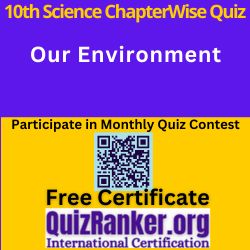10th Science Our Environment MCQ Test Chapter 13: Test your knowledge with free online multiple-choice questions for CBSE Class 10 Science Chapter 13. Understand ecological concepts, environmental issues, and the impact of human activities. Ideal for CBSE exam preparation and competitive tests.
10th Science Our Environment MCQ Test Quiz
Chapters of 10th Science for MCQ Test
You can not only check your knowledge about for “10th Science Our Environment MCQ Test Chapter 13” but also all remaining chapters multiple choice questions.
Chapter 1 Chemical Reactions and Equations MCQ Test
Chapter 2 Acids, Bases and Salts MCQ Test
Chapter 3 Metals and Non-metals MCQ Test
Chapter 4 Carbon and its Compounds MCQ Test
Chapter 5 Life Processes MCQ Test
Chapter 6 Control and Coordination MCQ Test
Chapter 7 How do Organisms Reproduce? MCQ Test
Chapter 8 Heredity MCQ Test
Chapter 9 Light – Reflection and Refraction MCQ Test
Chapter 10 The Human Eye and the Colourful World MCQ Test
Chapter 11 Electricity MCQ Test
Chapter 12 Magnetic Effects of Electric Current MCQ Test
Chapter 13 Our Environment MCQ Test
Also Attempt Free 10th class Math chapter wise MCQ Quiz [For Exam 2025]
Must Attempt Monthly Quiz Contest
- Class 9th Science quiz contest monthly
- Class 9th Math quiz contest monthly
- Class 10th Science quiz contest monthly
- Class 10th Math quiz contest monthly
You can also participate in yearly national quiz contest Dec 2024
Important Link
- NCERT Books PDF
- Our Youtube Channel(Subscribe for view Few Quiz Question Answers)
About 10th Science Our Environment MCQ Test
Chapter 13 of the CBSE Class 10 Science curriculum, titled “Our Environment,” focuses on ecological principles, environmental issues, and the interactions between living organisms and their surroundings. This chapter is essential for understanding how ecosystems function, the impact of human activities on the environment, and measures for environmental conservation. The free MCQ quiz provided in this chapter will help students consolidate their understanding and prepare effectively for their CBSE examinations.
Key Concepts Covered:
- Ecosystem:
- Definition: An ecosystem is a complex network of interactions between living organisms (biotic factors) and their physical environment (abiotic factors) in a specific area.
- Components of Ecosystem:
- Biotic Factors: All living organisms such as plants, animals, and microorganisms.
- Abiotic Factors: Non-living elements such as sunlight, temperature, water, soil, and air.
- Food Chain and Food Web:
- Food Chain: A linear sequence of organisms where each organism is a food source for the next. Example: Grass → Herbivore → Carnivore.
- Food Web: A more complex network of interconnected food chains in an ecosystem, representing the multiple feeding relationships among organisms.
- Biogeochemical Cycles:
- Water Cycle: The continuous movement of water between the atmosphere, land, and bodies of water through processes like evaporation, condensation, precipitation, and infiltration.
- Carbon Cycle: The process by which carbon is exchanged between the atmosphere, oceans, soil, and living organisms. Key processes include photosynthesis, respiration, and decomposition.
- Nitrogen Cycle: The cycle through which nitrogen is converted between its various chemical forms, including fixation by bacteria, assimilation by plants, and return to the atmosphere.
- Pollution and Its Types:
- Air Pollution: Contamination of the atmosphere by harmful substances such as carbon monoxide, sulfur dioxide, and particulate matter. Major sources include industrial emissions, vehicle exhaust, and burning fossil fuels.
- Water Pollution: Contamination of water bodies by pollutants such as chemicals, sewage, and plastics. Sources include industrial discharge, agricultural runoff, and improper waste disposal.
- Soil Pollution: Degradation of soil quality due to the presence of hazardous substances such as pesticides, heavy metals, and industrial waste.
- Environmental Issues and Conservation:
- Global Warming: The increase in Earth’s average temperature due to the greenhouse effect caused by elevated levels of carbon dioxide and other greenhouse gases.
- Ozone Depletion: The reduction of the ozone layer in the stratosphere, primarily due to chlorofluorocarbons (CFCs), leading to increased UV radiation reaching the Earth’s surface.
- Deforestation: The clearing of forests for agriculture, urban development, or logging, resulting in habitat loss, reduced biodiversity, and increased carbon emissions.
- Endangered Species: Species at risk of extinction due to habitat loss, poaching, and environmental changes.
- Sustainable Practices:
- Renewable Resources: Resources that can be replenished naturally, such as solar energy, wind energy, and water.
- Waste Management: Strategies for reducing, recycling, and managing waste to minimize environmental impact. Includes practices like composting, reducing plastic use, and proper disposal of hazardous materials.
- Conservation Efforts: Measures to protect natural resources and biodiversity, including the establishment of protected areas, wildlife conservation programs, and environmental education.
- Role of Individuals and Communities:
- Environmental Awareness: Understanding and recognizing the impact of personal and collective actions on the environment.
- Community Actions: Initiatives like clean-up drives, tree planting, and advocacy for environmental policies to promote sustainability and conservation.
Quiz Structure:
The MCQ quiz for this chapter includes a series of questions designed to test students’ understanding of ecological concepts, environmental issues, and conservation strategies. These questions cover definitions, processes, and practical applications related to the environment. The interactive format allows students to practice and assess their knowledge effectively.
Conclusion:
Practicing with the 10th Science Our Environment MCQ Test Chapter 13 is an excellent way for CBSE students to prepare for their exams. This chapter provides a comprehensive understanding of how ecosystems function, the impact of human activities on the environment, and measures for conservation. The MCQ quiz helps reinforce these concepts, ensuring students are well-prepared for their academic assessments and competitive exams.
Total Views: 90
